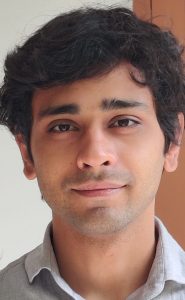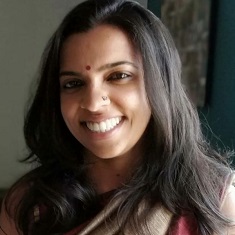Reflections | One year of the Dr N R Madhava Menon Scholarship
October 4, 2021
It has been one year since NLSIU introduced its first ever scholarship for PhD students – the Dr N R Madhava Menon Scholarship. The Doctoral Scholarship, funded by GE India, is a three-year programme that sponsors three meritorious students admitted to NLSIU’s PhD Programme. The Scholarship was one of the initiatives of the University to further efforts in raising our research output quality to the highest standards.
Upon completing a year, we spoke to the three candidates, who reflected on the progress in their research and their involvement with other activities at the University.
Raag Yadava

Alongside completing his literature review for his research during the last academic year, Raag wrote two papers on the Constitution – Ethics Committees in Legal Research; and Objectivity and Subjectivity in Legal Reasoning. His PhD focuses on a metaphysical defence of freedom, equality and diversity based on the writings of Sri Aurobindo in his seminal work – The Human Cycle.
As a faculty member, he is set to take the ‘Legal Methods’ and ‘Jurisprudence’ courses for the BA LLB programme, and a research seminar course on Sri Aurobindo’s Political Psychology this academic year. While in the process of publishing a couple of papers this term, he is also preparing to further his research for his doctorate.
“The first year of a long term research programme like the doctorate is best described as an exploration, which gives one the freedom to engage with a range of materials, travel down many dead ends, pursue original lines of inquiry, all of which helps build a comprehensive understanding of the discipline. This first principles, going back to the basics approach, is an equally enriching and challenging exercise which allows one to re-evaluate fundamental issues and develop the outline of an original contribution to the field. As we enter the new academic year, I am excited to welcome the incoming cohort of Menon Scholars, especially as the university is opening physically after a long hiatus in November,” he said.
Varsha Aithala
 Varsha is working closely with the university’s Law, Technology and Society cluster. She is also teaching an elective course titled ‘Impact, Innovation and Investment’ to the students of the Master of Public Policy programme.
Varsha is working closely with the university’s Law, Technology and Society cluster. She is also teaching an elective course titled ‘Impact, Innovation and Investment’ to the students of the Master of Public Policy programme.
“By participating in two intensive research and writing workshops, I received useful feedback on my thesis from subject experts and peers – both within NLSIU and externally. My doctoral work has also enabled me to explore critical barriers to effective access to justice in India through my writing,” she said.
She recently presented her paper titled ‘Look’ all right? Court design and access to justice in India’ at the 18th Asian Law Institute (ASLI) Conference on ‘Law, Technology, and Diversity in Asia’.
In the next year, following IRB and other approvals, she will commence her fieldwork for data collection, and following data analysis and further research, evolve recommendations for systemic reform of the Indian legal system. “In the next few years following my doctorate, I hope to continue to contribute to the teaching, research and awareness building initiatives at NLSIU, by creating insightful work capable of generating community impact and being fully responsive to people’s unmet legal needs,” she said.
Arvind Narrain
Arvi nd, who set out on his doctoral journey to explore what he calls ‘Ambedkarite Jurisprudence’, contributed for the five-volume set on Dr. Ambedkar this term. The piece titled, ‘Radical Constitutionalism: Towards an Ambedkarite Jurisprudence’ was published in the third volume of B.R. Ambedkar: The Quest for Justice: Legal and Economic Justice.
nd, who set out on his doctoral journey to explore what he calls ‘Ambedkarite Jurisprudence’, contributed for the five-volume set on Dr. Ambedkar this term. The piece titled, ‘Radical Constitutionalism: Towards an Ambedkarite Jurisprudence’ was published in the third volume of B.R. Ambedkar: The Quest for Justice: Legal and Economic Justice.
He presented the legal and political thought of Dr Ambedkar at various sessions and forums, including NLSIU’s MPP programme, Political Science department at Ramaiah College, St. Joseph’s College and other civil society spaces.
Having completed literature review, he is all set to write the first substantive chapter of his thesis. “In 2021, I will continue to engage with the thought of Ambedkar in public forums and hope to offer a course which looks more closely at his contribution to the shaping of Indian democracy,” he said.

